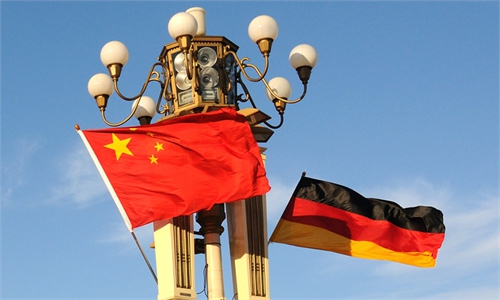Germany's reported move to place restrictions on Chinese telecom gear will backfire: analyst

5G Illustration: Chen Xia/GT
The German government's reported move to restrict the use of Chinese telecom equipment in the country's mobile networks, which is politically motivated, will slow down Germany's 5G deployment and cause massive costs for gear replacement, analysts said.
And, the restriction will harm cooperation between China and the EU, which has been hamstrung by the bloc's recent anti-subsidy investigation into Chinese electric vehicles.
According to a Reuters report, Germany's interior ministry has proposed forcing telecoms operators to curb their use of equipment made by China's Huawei and ZTE. The ministry reportedly designed an approach to limit networks disruption as German operators remove critical components made by Chinese vendors prior to 2026.
The approach soon drew a backlash from German operators. Deutsche Telekom called the deadline unrealistic, while Telefonica Deutschland said it would consider seeking damages as well as legal action, according to the Reuters report.
In response, Mao Ning, a spokesperson for China's Foreign Ministry, said on Thursday that "We always oppose any country's politicization of economic, trade, science and technology issues. We believe that all countries should provide a fair, non-discriminatory and transparent business environment for businesses."
Xiang Ligang, director-general of the Beijing-based Information Consumption Alliance, told the Global Times that it will be difficult for local operators in Germany to find high-quality, cost-effective replacements for Chinese products, and whether the government would provide targeted subsidies is unknown as the German economy is facing downward pressures.
"About half of Germany's telecom base stations are equipped with Huawei gear, which means that if Berlin sticks to the removal of all Huawei equipment, it could cost several billion euros. Apart from the economic loss, the politically motivated move will dial back German telecom networks by years," Xiang noted.
Germany's national railway operator would have to spend 400 million euros ($437.5 million) to replace all the components in its infrastructure supplied by Huawei, German news magazine Spiegel reported earlier.
China will not "sit idle" if Germany decides to ban Chinese companies from the country's 5G network without credible evidence that Chinese firms pose the so-called "national security" threat, Chinese Ambassador to Germany Wu Ken said.
It is understandable that Berlin wants to improve security of its mobile network, but it should not be used as an excuse to politicize normal economic and trade cooperation between the two countries, Wu said during an interview with German newspaper Berliner Zeitung in August.
Despite mounting pressure from Washington to impose curbs on Chinese high-tech companies, German politicians should be rational and give top priority to the country's development of 5G network and information infrastructure.
"Recent allegations that Germany's economic difficulty partially stemmed from China's competition, as hyped by some Western media, are misplaced," Zheng Chunrong, director of the German Studies Centre at Tongji University, told the Global Times.
China and Germany have strong demand and potential for cooperation in many fields such as advanced manufacturing, innovation and environmental protection. "The right solution for the problems faced by the German economy is to maintain and strengthen cooperation with China," Zheng noted.
Jens Hildebrandt, executive director of the German Chamber of Commerce in China, said in a recent event in Beijing that it is unrealistic for Germany to seek "decoupling" from China.
"De-risking" not only means an increase in costs but is also difficult to achieve in the short term. He said that Germany's "China strategy" should take into account the actual situation of German companies now operating in China.
More than 5,000 German firms are operating in China, and the majority of them attach high importance to the market, a major profit-making market for them.



